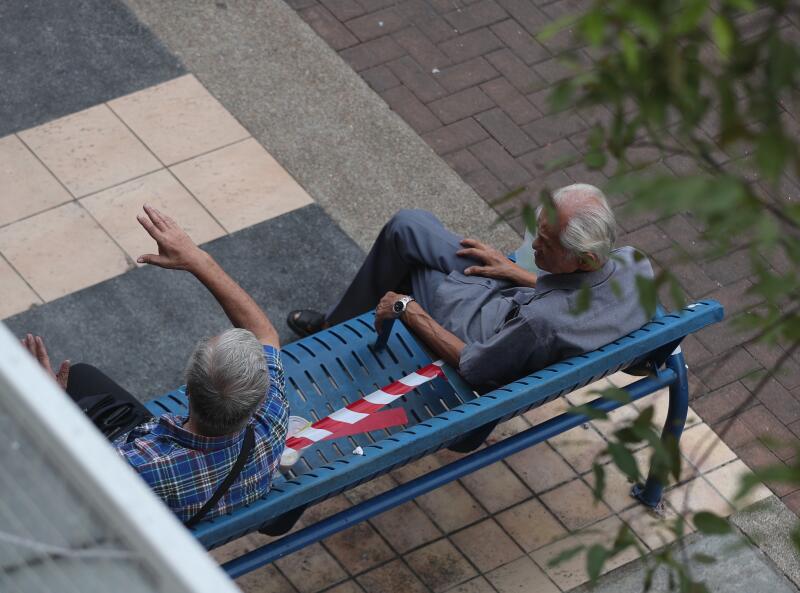Coronavirus: Social workers pound the streets to persuade seniors to go home and stay indoors
Sign up now: Get ST's newsletters delivered to your inbox

Social workers interviewed said most seniors they know try their best to stay home.
ST PHOTO: KELVIN CHNG
Follow topic:
SINGAPORE - Social workers have been roped in to persuade seniors who are out and about to stay at home as the circuit breaker measures are tightened to further stem the spread of Covid-19.
Since mid-April, the Housing Board (HDB) has been collaborating with social service agencies Montfort Care and Fei Yue Community Services in a bid to to engage the elderly who "frequent" areas such as Bedok, Chinatown and Redhill, an HDB spokesman told The Straits Times on Friday (April 24).
She said the move is part of a targeted approach to do more for vulnerable groups like the elderly, who may need greater assistance and support.
She said: "With their expertise, social workers can better understand and relate to these seniors, and help to strengthen our efforts to reach out, engage, and educate the elderly on the importance of staying home during this period and to persuade them to return home.
"The elderly are generally receptive to the advice of the social workers to stay home."
On April 10, Prime Minister Lee Hsien Loong appealed directly to seniors, during a national address, to stay at home as they are more vulnerable to the corona virus.
Since the circuit breaker period started on April 7, there have been reports of elderly men who gather to drink, smoke and gamble openly in a Redhill block, according to Shin Min Daily News quoting residents.
More recently, a widely shared video shows an elderly woman who defiantly continued eating her bowl of kway chap at a market despite being told patiently and repeatedly about the rationale for the need to stay home.
Social workers interviewed said most seniors they know try their best to stay home.
Montfort Care social worker Kevin See said its social workers are paired with the Safe Distancing Ambassadors when they go out.
Safe Distancing ambassadors from various agencies are deployed islandwide to guide and advise businesses and individuals to comply with safe distancing measures.
He said the seniors they see are often people-watching as they sit at void decks, markets, pavilions and public benches.
Some walked away before the social workers could approach them, while others explained they were resting enroute to going home. A minority gave the reasons for being outdoors instead of staying home.
One reason is their strained ties with family members at home or with the person they are sharing a small rental flat with, said social workers from Montfort Care and Fei Yue Community Services.
Some say they live in a small and stuffy flat and need to go out for fresh air and sunshine.
Fei Yue's spokesman said: "The seniors were already emotionally and psychologically stressed living with their family members during normal times. Now, with no choice but to face the members at home, the hours spent together in a confined space may cause greater friction, like nitpicking on one another."
Other social workers interviewed say many of the seniors are used to meeting their friends regularly for a drink or meal and do not go online to keep themselves entertained or occupied.
Mr See said: "A senior told me 'You want me to stay at home and face the four white walls, I will go crazy. I'd rather die.'"
Ms Peh Kim Choo, chief executive of the Tsao Foundation, pointed out that seniors are not a homogenous group. They come from different socio-economic backgrounds, with different psychological make-ups.
There are those who do not see the pandemic as dire so they do not agree with the Government's push for people to stay at home.
"They only feel a higher sense of helplessness and anxiety, as well as a sense of being 'bullied' because the communication of change has been one-way and rather abrupt. Thus they might react to the sudden changes in a manner that most of us will feel is defiant and stubborn," she added.
Mr Kavin Seow, Senior Director, Elderly Group, TOUCH Community Service, explained that while some people may see the behaviour of such seniors as stubborness, it is important to understand that they may not be aware of the rapidly-changing rules and they need more time to make sense of what is happening.
He said: "The hardships they have endured in the past have further strengthened the elderly's resilience and determination to hold dear to what matters to them - their freedom and independence. Having to suddenly change their habits and have their freedom taken away overnight is challenging for them, even for most of us."
Mr See said that social workers are trained to understand the underlying reasons of some seniors for spending time outdoors and to address them. Also, the social workers can refer them to help services if the seniors needed them.
Said Fei Yue's spokesman: "Most of the seniors respond positively to our coaxing and will head home. The soft and persuasive approach usually works."
Madam Mary Ee, 82, used to go out daily to the market and she also volunteers to check in on other vulnerable seniors.
Now, she is staying at home and using the time to call old friends to catch up and try new recipes for herself and her husband.
She is also worried that some of her friends who live alone may become depressed, given the isolation.
"I feel sad to see the Government doing so much to protect us but some people don't care and refuses to wear a mask and never maintain social distancing."

